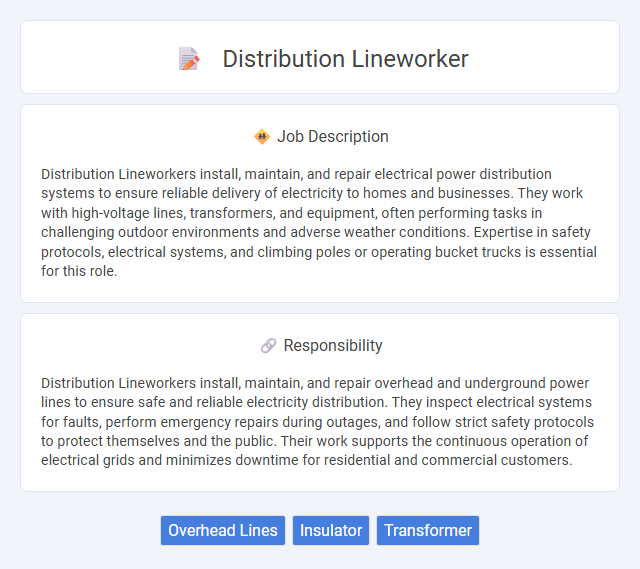
Distribution Lineworkers install, maintain, and repair electrical power distribution systems to ensure reliable delivery of electricity to homes and businesses. They work with high-voltage lines, transformers, and equipment, often performing tasks in challenging outdoor environments and adverse weather conditions. Expertise in safety protocols, electrical systems, and climbing poles or operating bucket trucks is essential for this role.
Individuals who are physically fit and able to work in varying weather conditions will likely be suitable for a Distribution Lineworker role, given the demanding nature of climbing poles and handling heavy equipment. Those with a strong attention to safety protocols and the ability to remain calm under pressure have a higher probability of succeeding in this field. Candidates who might struggle with heights, physical labor, or irregular work hours may find this job challenging and less compatible with their personal conditions.
Qualification
Distribution Lineworkers require specialized training in electrical systems and safety protocols, often obtained through technical schools or apprenticeships. Certification from organizations like the National Joint Apprenticeship and Training Committee (NJATC) enhances job prospects and demonstrates proficiency in high-voltage line maintenance. Physical fitness, ability to work at heights, and knowledge of power distribution equipment are crucial qualifications for ensuring reliable electricity delivery.
Responsibility
Distribution Lineworkers install, maintain, and repair overhead and underground power lines to ensure safe and reliable electricity distribution. They inspect electrical systems for faults, perform emergency repairs during outages, and follow strict safety protocols to protect themselves and the public. Their work supports the continuous operation of electrical grids and minimizes downtime for residential and commercial customers.
Benefit
Distribution lineworker jobs likely offer competitive benefits including comprehensive health insurance, retirement plans, and paid time off. Employees may also have access to training programs aimed at career advancement and skill development. Job stability and potential overtime pay could enhance overall compensation packages.
Challenge
Distribution Lineworker jobs likely involve challenging tasks requiring physical strength, technical skills, and adherence to safety protocols while working with live electrical lines. The work environment may pose hazards such as extreme weather conditions, heights, and electrical exposure, making the role demanding and requiring constant vigilance. Problem-solving and quick decision-making abilities are probably essential to efficiently address unexpected issues and ensure reliable power distribution.
Career Advancement
Distribution Lineworker careers offer structured advancement through apprenticeships, gaining journeyman status, and specializing in high-voltage or underground systems. Advancement opportunities include supervisory roles, project management, and technical training positions, often supported by unions. Continuous skill development and certification in safety and technology certifications enhance promotion prospects within utility companies.
Key Terms
Overhead Lines
Distribution lineworkers specializing in overhead lines maintain and repair electrical power distribution systems, ensuring reliable delivery of electricity to residential and commercial areas. They work with high-voltage power lines elevated on poles or towers, performing tasks such as cable installation, conductor stringing, and hardware replacement while adhering to strict safety protocols. Expertise in climbing techniques, electrical systems, and the use of specialized tools like hot sticks and bucket trucks is essential for efficient overhead line maintenance.
Insulator
Distribution lineworkers specializing as insulators install and maintain electrical insulators on utility poles and transmission towers, ensuring reliable separation of electrical conductors and preventing shorts or outages. They handle high-voltage systems by securing ceramic, glass, or composite insulators, which play a crucial role in the electrical grid's stability and safety. Expertise in climbing, safety protocols, and electrical theory is essential to prevent power disruptions and maintain system integrity.
Transformer
Distribution Lineworkers are responsible for installing, maintaining, and repairing electrical distribution transformers, ensuring reliable voltage regulation across power lines. They perform critical tasks such as transformer mounting, wiring, and testing to prevent outages and optimize energy flow within the grid. Expertise in handling pad-mounted and pole-mounted transformers is essential to maintain consistent power distribution and safety compliance.
 kuljobs.com
kuljobs.com